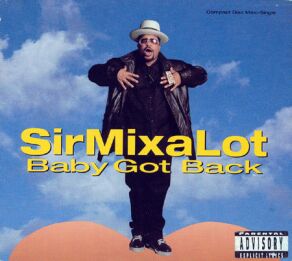Oh. My. God.
What have I done.
Titillated by my horror, she started singing it louder, and more, and smiling giddily while doing so.
Then, my 3 1/2-year old, who had been watching all of what is commonly known as the classic "child/parent nonverbal horror-titillation feedback cycle," joined in. Because obviously.
Oh. My. God.
I'm a terrible mother. How did this happen? How did I end with two children delightfully powering out this line from Sir MixaLot's "Baby Got Back" in the bathtub?
In moments like this, you have two choices, as I see it. One: laugh, embrace the passing on of a classic song of my own generation to my kin, and appreciate my kids' exposure to all the pleasures of popular culture.
Alternatively, and less likely, I can undo their learning. Good luck. Parental advisory noted, but how was I supposed to see "big butts" coming down the pike? I mean, she's only 7 for goodness sake! I wasn't prepared for this.
Ok, so, let's go with option 1: laugh and try to make lemonade with these lemons.
I think of myself as a mediator of the world--not the maker of the world-- for my kids. I love grabbing these teaching moments by the horn, and relinquishing the pretense that I can be a kind of saran wrap around my kids, a prophylactic to cultural effluvia.
"Baby's Got Back" isn't really effluvia, either. Actually, it was a feminist anthem of my generation. Who can argue with "my anaconda don't want none unless you got buns, hon!"? And c'mon, this is funny: "you can do side-bends or sit-ups, but please don't lose that butt!" The song was an irreverent thumb in the eye of the expectations of femininity in American culture, which is and certainly was (in 1992, the year I consider the peak of musical craziness in my life) raced as much as it's gendered. That is, embracing a big butt was both a rejection of patriarchal culture's expectations of thinness and a rejection of white culture's ideals of femininity.

Sure, the song has problems. Sure, it still sexualizes women and dissects them into body parts, and does so in ways that don't do any kind of woman any favors. The video of the song repeated all the same misogynistic tropes that the genre was famous for, except it did so with women who have large rear ends instead of skinny ones. Not all that radical, you could say. In some ways, sure, the song didn't undo as much patriarchy as it perpetuated.
Ok, but flash forward to your 7-year old girl coming home singing it in 2017.
I carry on the campaign to teach kids that women are whole people and that they are not reduced to their looks, regardless of the girth or lack thereof of their backsides. We are more than our backsides. But this song isn't the first chance I've had to have that conversation, PA-LEASE, people.
From Hillary to Melania to Michelle, ample opportunities exist to explore how women's whole identities matter little compared to their looks in American culture. Sir MixaLot isn't the only one preaching that message.
The real challenge is to not be horrified by my child's lost innocence, because I can't keep her in a bubble forever. She's going to grow up in this white supremacist patriarchal culture, so I'm going to start from that premise. Instead of pretending that we aren't all breathing in all that toxicity all the time, whether we choose to recognize it or not (aka "white privilege"), or, even more importantly, whether we have no choice in the matter in the first place, I am going to unpack "Baby's Got Back" with my kiddos.
My near-7-year old loves talking about racial and sexual history and politics; she is profoundly interested in understanding how people operate and interact, and how power has worked in history. So, even though I haven't quite figured out my approach with this particular song, I will. By bringing that song home, she's opening up a wonderful window into the context of her daily life, and thus an opportunity to talk about these difficult conversations. I'll leave the sex stuff out (for now), but the gender and race stuff is being handed over on a silver platter; I want to rise to the occasion and take this chance to talk to her: why was the song was so powerful, what kind of cultural work was it doing when it came out, why might people not like hearing her, much less her younger sister, sing it, etc?
It'll be fun and important, one day, to deconstruct the cultural shenanigans going on in this Friend's episode, "The One with Ross's Inappropriate Song". Why would this song be "inappropriate" in this show? Why is this storyline "funny", and to whom? What assumptions about race, class, and gender does the joke rely on to work," and who might it hurt?
At the very least, in any way my young girls can receive drips and drops of the message that big is beautiful, to shore up some strength against the tidal waves of "big is not beautiful", I'll take it. Sir MixaLot did that for me and who knows how many other young women, and, obviously, still is. The song may reinforce some kinds of problems even as it rejects one form of oppression, but I'll take it.
I'm not putting my kids in a bubble. My parents didn't put me in a bubble, though I do sometimes wish I hadn't seen so many damn Disney movies. Seriously. I'm still traumatized by the realization that life after marriage is not happily ever after, just sayin'.
But if I can't control what my kids absorb in their hours when they aren't under my roof, I can at least parent the shit out of this song.
No comments:
Post a Comment